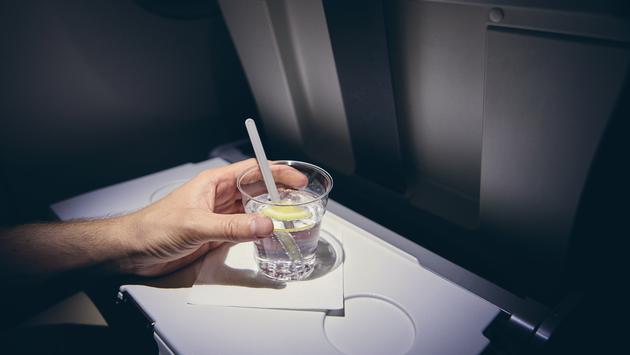
Air travel is booming once again, with airlines expanding their route networks and restoring in-flight perks, like three-course meals and onboard cocktails. But there’s one airline that is still limiting booze for fliers in coach.
American Airlines has a plan to phase in alcoholic beverages to economy class, with potential new limitations. In a first-of-its-kind policy, the airline’s flight attendants union is requesting American implement a two-drink maximum for all economy passengers.
“Our customers have expressed that having these options onboard is important to their experience with us,” American Airlines said of alcoholic drinks in a statement released earlier this month, adding that alcohol and light snacks would be made available for purchase on flights more than 250 miles starting April 18. Just as quickly, the union representing American Airlines flight attendants, The Association of Professional Flight Attendants, requested the airline institute a two-alcoholic drink limit per passenger, per flight.
The new limit would be part of an ongoing effort to curb unruly and violent passenger incidents, which began spiking during the pandemic and often involved drunk fliers. Previously, American had strategically set the return of alcohol sales to the same date the Federal Transportation Mask mandate was set to expire. As the mandate was extended, so was American’s return to alcohol sales. However, that changed, also on April 18, when the federal mask mandate was repealed.
Some American flight attendants continue to question “if the invasive, abusive and violent behavior [will] leave with the [mask] mandate, or whether this has become the norm,” according to responses on a union “hotline” for American flight attendants based in Los Angeles. The union cites the drink limit as a way to mitigate whether the mask mandate, alcohol, or a combination of both were to blame for the spike in unruly passengers.
Despite the union’s position, the airline’s flight attendants appear to be split over whether limiting alcohol intake will truly result in a smoother flight experience for passengers and crew. “Love it! Too many problems with alcohol” is one comment I received when I posed the question of whether or not the limit should be implemented to a group of American Airlines flight attendants. “I applaud trying…despite naysayers,” said another crew member.
There’s no doubt that intoxicated airline passengers are a complex issue, one that airlines struggled with even before COVID. Pre-pandemic, it wasn’t uncommon for lawsuits to be filed against airlines—and flight attendants specifically—for “over-serving” passengers. Various suits alleged alcohol played a role in sexual harassment on and off the plane, drunk driving incidents, and even domestic violence after the plane had landed, to name a few. Federal regulations have always stated that it’s against the law for a passenger to board an airplane if they appear to be intoxicated, and it’s also against the law to drink alcohol on board that wasn’t served by the airline. But these situations are sometimes hard to catch.
For their part, airline leaders worry about making such an accusation against a passenger. During flight attendant training, new hires are strictly told they cannot say someone is “drunk” or “intoxicated,” but they have to phrase it as the passenger “appears to be” under the influence of alcohol or another substance. There are also specially trained employees at each airline to handle the situation if the airplane is still on the ground at the gate, but once in the air, trainees are taught that they and their fellow crew members should work together, observe the passengers in question, and decide if they should suspend serving them any further alcoholic beverages.
Many flight attendants feel as though the two-drink limit is not a necessity. “I disagree with a limit, 100 percent,” says Kristin, an American Airlines flight attendant. “The bad passengers should not be able to ruin it for the good ones. When a passenger appears to be drunk, we stop serving them. Sometimes it’s before we’ve served them one drink on the plane,” Kristin says, noting that an unknown amount of beverages could be served at home or at airport bars and lounges prior to boarding. The majority of the comments I received from flight attendants echoed the feeling that cabin crew members had been dealing with alcohol-related unruly passengers before the pandemic, and they’ll still encounter them post-pandemic, regardless of a limit, but they can manage and handle it. Most don’t see the surge in unruly passenger incidents over the past two years as a reason to impose a limit on the service they provide.
On that topic, it should be noted that crew members as a whole worry about overall customer satisfaction. As Chuck, an American captain, explained: “The customer will win, by letting management know that they don’t appreciate the limits being imposed on them, most likely by going somewhere else.”
If instituted, it’s unclear how—or if—the limit would be levied on American Airlines’ highest paying premium business and first-class passengers. During the suspension of alcohol sales in the main cabin, those seated in premium cabins did still receive alcoholic beverages on request. American Airlines’ “Main Cabin Extra” product, or domestic premium economy, is advertised as also having “complimentary beer, wine and spirits” included, but read the fine print for all cabins of service on American Airlines and you’ll find the disclaimer: “The number of drinks served may be limited.” cntraveler.com
